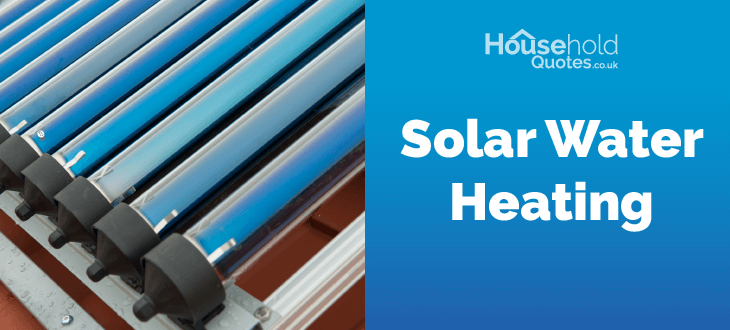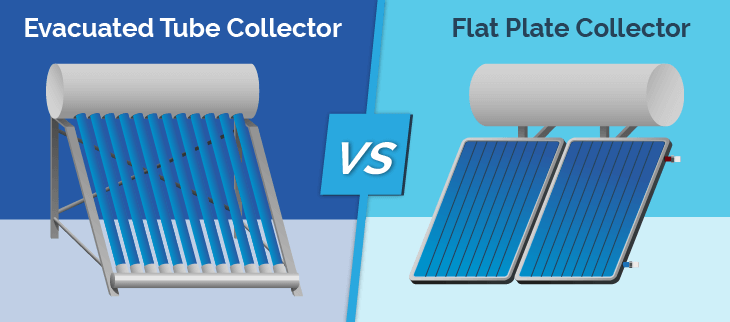Answer these simple questions and we will find you the BEST prices
Which type of solar quotes do you need?
It only takes 30 seconds
100% free with no obligation

Get up to 4 quotes by filling in only 1 quick form

Compare quotes and find yourself the best deal

Increase the value of your home by installing solar panels
- Householdquotes.co.uk
- Solar Energy
- Solar Water Heating
Solar Water Heating in the UK: Costs, Pros, Cons & Types (2025)


- Solar thermal panel costs tend to run from £2,500 to £5,000, depending on factors like the size, type and number of panels.
- Solar water heating can save you between £130 - £235 annually, allowing you to potentially break even after 11 years.
- Solar water heating systems provide domestic hot water by using solar thermal collectors, typically attached to your roof, to absorb heat from the sun and transfer it to your home's water supply.
With solar water heating, you can rely on the sun's energy to provide as much as half of your domestic hot water during certain times of the year. This can help you make significant savings, up to £235 annually, on your energy bills, as there's less need to fire up your existing heating system. Instead, you're taking advantage of a free and renewable energy source.
If you're considering solar water heating for your home, this article is here to take you through all there is to know. If you're already certain that this innovative solar technology is the best thing for you, then Household Quotes can also help you by connecting you with the perfect installer for the job.
Finding the best installer for a solar water heating system installation can take hours of research. To save yourself this time, fill in our quick 30-second form to be directly contacted by up to 4 solar installers from within our vetted network.
You can then compare their tailored quotes to find the best deal. Our service is completely free and you're under no obligation to accept any of the quotes you receive. Click the button below to get started.
- Quotes from local installers
- Payment by finance available
- Save up to £915 per year
It only takes 30 seconds

How does solar water heating work?
You may have come across different types of solar panels. Solar panels generate electricity rather than heat water.
Similarly to traditional solar panels for your home, solar water heating systems use free solar energy to provide domestic hot water. Solar water heating, on the other hand, provides hot water with solar collectors. These capture sunlight and convert it into heat energy specifically for heating water.
These collectors, often resembling solar PV panels, are typically positioned on rooftops to maximise exposure to sunlight. However, they can also be installed on the ground level or south-facing walls and operate just as effectively.
There are 2 primary types of solar thermal collectors: flat plate collectors and evacuated tubes. Once installed, highly insulated pipes connect the collectors to a hot water cylinder.
A heat transfer fluid, made up of water and anti-freeze, is pumped through the collector where it is heated before being directed back to the top of the hot water cylinder. More pipes then distribute the hot water throughout the home for use.
Although solar water heating systems can supply a significant portion of hot water needs, they may not suffice during periods of low sunlight. As such, an additional heating system such as a boiler is recommended to meet peak demands. However, running a boiler alongside solar water heating minimises both heating costs and carbon emissions.
Solar water heating cost: Solar water panel prices in the UK
Solar thermal panel costs tend to run from £2,500 to £5,000, including supply and installation. The total costs depend on factors like the size, type and number of panels.
Evacuated tube solar panels typically cost slightly more compared to flat plate solar panels. The number of panels required can be estimated according to the size of your home and your typical hot water demands.
| Solar water heating cost | ||||
|---|---|---|---|---|
| House size | System size | Evacuated-tubes | Flat plate collectors | Potential cost (supply and installation) |
| 1-2 bedrooms | 2m² | 10-20 | 1-2 | £2,500–£3,000 |
| 2-3 bedrooms | 3m² | 20-30 | 2-3 | £3,000–£3,500 |
| 4-5 bedrooms | 4m² | 40-50 | 4-5 | £3,500–£4,000 |
| 5+ bedrooms | 5m² | 50+ | 5 | £4,500 - £5,000, |
The total cost includes additional components such as a controller, pump, valves, pipework, and a hot water cylinder.
Your current boiler and hot water cylinder will need to be compatible with a solar hot water system. Otherwise, you’ll need to upgrade these. Most installations require a larger-than-standard twin coil water cylinder to accommodate the heat exchanger system and store enough hot water to make up for periods of reduced solar effectiveness, such as on cloudy days.
A twin coil hot water cylinder is priced between £500 and £1,500 depending on size and specifications.
Solar water heating savings
According to the Energy Savings Trust, savings can reach up to £130 per year when switching from a gas heating system, and £235 per year when switching from an electric heating system.
Solar water heating can meet around half of your domestic hot water needs during the summer months. This allows you to make significant energy bill savings since you're relying on a free, renewable energy source.
| Solar water heating savings | ||
|---|---|---|
| Pre-existing heating system | Potential annual energy bill savings | Potential break-even point |
| Gas | £130 | 21 years |
| Oil | £155 | 17 years |
| Coal | £205 | 13 years |
| Electricity | £235 | 11 years |
| LPG | £155 | 17 years |
During winter months, when there is less available sunlight, your backup heating system will cover most of your domestic hot water needs.
Solar water heating grants
There are no UK-wide grants available that target solar water heating specifically.
In Scotland, however, you can receive a loan of up to £5,000 for solar water heating systems. This loan is part of the Home Energy Scotland Grant and Loan Scheme and is accessible to all homeowners in Scotland.
The Home Energy Scotland Grant and Loan is no longer offering funding for solar panel or solar energy storage installation as of June 6 2024. However, you can still apply for this scheme if you’re looking to upgrade to other clean energy systems or make energy efficient improvements to your home.
While grant funding is limited in the UK, if you require a new boiler to accompany your solar water heating system, then homes across the UK can apply for an ECO4 grant. Bear in mind, the ECO4 grant is no longer active in Northern Ireland.
You can instead apply fo the Affordable Warmth Scheme.
The Energy Company Obligation 4 (ECO4), targets medium and large energy suppliers to enhance the energy efficiency of homes with an Energy Performance Certificate (EPC) rating of D or below. It prioritises low-income households and those receiving specific benefits, offering funding for improvements such as boiler replacements or free solar panels.
While there may not be much in the way of solar water heating funding options, there is an easy way to save on installation costs. By comparing quotes from at least 3 installers, you are in the best position to land a good deal. However, sourcing the best options to compare can be risky since you don't want to hand over your project to the wrong hands.
Thankfully, with Household Quotes' free and non-binding quotes service, you can be sure that all of our installers are fully vetted. Click the button below to get up to 4 quotes for solar panels or solar water heating from the top-rated options in your area.
- Quotes from local installers
- Payment by finance available
- Save up to £915 per year
It only takes 30 seconds

Advantages of solar water heating
- Solar water heating can provide you with around half of your hot water needs in summer and slightly less in winter.
- You can save between £130 and £235 per year on your annual energy bills.
- Reduce your carbon footprint by using a renewable energy source and avoid releasing any carbon emissions.
- They’re suitable for new builds and older homes.
- They’re low maintenance and are low-cost to run.
Disadvantages of solar water heating
- A backup boiler or immersion heater is necessary to supply hot water when solar energy is unavailable and to boost hot water temperature.
- Solar thermal panels cost considerably more than conventional electric and gas heating systems.
- They are less effective on north-facing roofs or roofs in shaded areas.
Types of solar water heating systems
There are 2 main types of solar water heating systems, which differ in how they absorb heat.
Indirect circulation systems
These systems are most typically installed types of solar water heaters in the UK. They heat water using an antifreeze fluid, typically a mixture of water and glycol, which circulates between rooftop thermal collectors and a heat exchanger.
Direct circulation systems
In direct systems, water is directly heated by solar collectors installed on rooftops. Pumps circulate household water directly through these collectors and into the home.
There are 2 types of panels you could install as part of your solar water heating system. These include:

Evacuated-tube collectors
These collectors consist of multiple heat pipes surrounded by glass tubes. Each tube contains a glass outer tube and a metal absorber tube. Vacuum insulation within the tubes boosts efficiency, making evacuated-tube systems smaller than flat-plate collectors, but equally as effective.
Flat-plate collectors
These panels resemble solar PV panels. They are covered by a sheet of glass and feature a heat-absorption panel connected to copper pipes through which water or transfer fluid passes. These collectors come in two variations:
- Glazed flat-plate collectors: These collectors are insulated boxes containing a dark absorber plate under one or more glass or plastic covers, providing efficient heat absorption and insulation.
- Unglazed flat-plate collectors: These are the most affordable option and are typically used for solar pool heating. These collectors feature a dark absorber plate and usually come without a cover.
Is solar water heating the right choice for your household?
Most homes in the UK can benefit fully from solar water heating. Solar water heating systems can fulfil about 50% of hot water needs in summer, slightly less in winter, saving £130-£235 annually on energy bills. They reduce carbon emissions, suit various homes, and require low maintenance.
To determine whether solar water heating is suitable for your home, you should consider the following:
Is your existing boiler compatible with solar water heating?: Traditional boilers and cylinder systems usually integrate well with solar water heating. If you rely on a pre-existing combi boiler then you will be required to install an additional hot water cylinder.
Do you have enough space in your home?: Solar water heating systems typically include solar collectors, a hot water cylinder, and other additional equipment. The collectors require adequate roof space or ground area for installation, while the hot water cylinder, along with its base coil and potential supplementary heating elements will require considerable indoor space.
Do you have access to a sunlit area?: Ideal locations include south-facing rooftops or spaces between east to west, receiving direct sunlight for a significant portion of the day. Panels can also be fitted onto frames on flat roofs, walls, or the ground.
If you're still unsure whether your home meets the requirements for solar water heating, then it's best to consult a professional solar installer. Whether you're looking for the best solar panels, a new solar battery, or solar water heating, our network of solar installers can make a professional assessment and advise you as to the best options for you.
To get in touch with the best solar installers in your area, then use Household Quotes' free quotes service.
- Save time. Finding installers alone can take hours of online research. Our form takes only 30 seconds.
- Vetted installers. We will only match you with the top-rated installers, all of them pre-vetted by us.
- Multiple quotes. Compare up to 4 quotes and get the best deal possible.
To get started today, click the button below.
- Quotes from local installers
- Payment by finance available
- Save up to £915 per year
It only takes 30 seconds

Frequently asked questions
Solar water heating is worth it since it can reduce energy spending on hot water by around 50% during the summer months. This can result in savings of up to £235.
Some disadvantages to solar water heating include:
- Back up boiler or immersion heater is required for hot water when solar energy is unavailable and to boost temperature.
- Solar thermal panels may cost more to install than conventional electric and gas systems.
- Less effective on north-facing or shaded roofs.
Yes, solar water heaters do work during the winter months. However, they cannot provide as much hot water as during the summer months. You will therefore need a backup heating system to meet your demands.
A solar water heating system will typically last 10-25 years before needing a replacement.

Ciaran is a content writer at Household Quotes. He has become an expert in energy saving and eco-conscious living which he uses to create informative content for Household Quotes readers.
